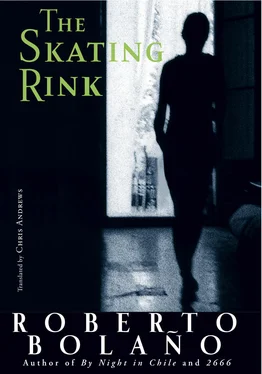Roberto Bolano - The Skating Rink
Здесь есть возможность читать онлайн «Roberto Bolano - The Skating Rink» весь текст электронной книги совершенно бесплатно (целиком полную версию без сокращений). В некоторых случаях можно слушать аудио, скачать через торрент в формате fb2 и присутствует краткое содержание. Год выпуска: 2009, Издательство: New Directions, Жанр: Современная проза, на английском языке. Описание произведения, (предисловие) а так же отзывы посетителей доступны на портале библиотеки ЛибКат.
- Название:The Skating Rink
- Автор:
- Издательство:New Directions
- Жанр:
- Год:2009
- ISBN:нет данных
- Рейтинг книги:5 / 5. Голосов: 1
-
Избранное:Добавить в избранное
- Отзывы:
-
Ваша оценка:
- 100
- 1
- 2
- 3
- 4
- 5
The Skating Rink: краткое содержание, описание и аннотация
Предлагаем к чтению аннотацию, описание, краткое содержание или предисловие (зависит от того, что написал сам автор книги «The Skating Rink»). Если вы не нашли необходимую информацию о книге — напишите в комментариях, мы постараемся отыскать её.
oscillates between two poles: a camp ground and a ruined mansion, the Palacio Benvingut. The story, told by three male narrators, revolves around a beautiful figure skating champion, Nuria Martí. When she is suddenly dropped from the Olympic team, a pompous but besotted civil servant secretly builds a skating rink in the ruined Palacio Benvingut, using public funds. But Nuria has affairs, provokes jealousy, and the skating rink becomes a crime scene. A mysterious pair of women, an ex-opera singer and a taciturn girl often armed with a knife, turn up as well.
A complex book,
’s short chapters are skillfully broken off with questions to maintain the narrative tension:
All of these questions are answered, and yet
is not fundamentally a crime novel, or not exclusively; it’s also about political corruption, sex, the experience of immigration, and frustrated passion. And it’s an atmospheric chronicle of one summer season in a seaside town, with its vacationers, its drifters, its businessmen, bureaucrats and social workers.
The Skating Rink — читать онлайн бесплатно полную книгу (весь текст) целиком
Ниже представлен текст книги, разбитый по страницам. Система сохранения места последней прочитанной страницы, позволяет с удобством читать онлайн бесплатно книгу «The Skating Rink», без необходимости каждый раз заново искать на чём Вы остановились. Поставьте закладку, и сможете в любой момент перейти на страницу, на которой закончили чтение.
Интервал:
Закладка:
Remo Morán:
It’s true: in May I found a job for Gaspar Heredia
It’s true: in May I found a job for Gaspar Heredia, Gasparín to his friends, a Mexican, a poet, and flat broke at the time. I’d never have admitted it, but I was in a state of nervous agitation as I anticipated his arrival. And yet when he appeared at the door of the Cartago, I hardly recognized him. The years had taken their toll. We gave each other a hug, and that was it. I often think that if we’d got talking or gone for a walk along the beach, and then drunk a bottle of cognac and broken down crying or laughed until dawn, I’d be telling a different story now. But after we hugged, a mask of ice clamped itself over my face, preventing the slightest expression of friendship. I knew he was helpless, small and alone, perched on his stool at the bar, but I did nothing. Was I ashamed? Had his presence in Z released some kind of monster? I don’t know. Maybe I thought I’d seen a ghost, and in those days I found ghosts extremely unpleasant. Not any more. Now, on the contrary, they brighten up my afternoons. It was after midnight when we left the Cartago, and I couldn’t even bring myself to try to make conversation. Still, although he was silent too, I sensed he was happy. At the campground’s office, El Carajillo (“coffee with a dash”), as he was known, had the television on and didn’t notice us. We kept on going. The tent that was to be Gaspar’s home had been pitched off to one side, next to the tool shed. It had to be in a relatively quiet place, since he would be sleeping during the day. Gasparín was perfectly content; in his deep voice he said it would be like living out in the country. As far as I know, he’s lived in cities all his life. On one side of the tent there was a tiny pine, more like a Christmas tree than the sort of pine you normally find in a campground. (Because the spot had been chosen by Alex, and he was always playing some incomprehensible mind game, I couldn’t help trying to guess at its arcane significance. Was Gasparín like a Christmas present?) After that I took him to the washrooms and showed him how the showers worked, and then we went back to reception. That was it. I didn’t see him again until a week later, or something like that. Gasparín and El Carajillo became good friends. It’s hard not to be friends with El Carajillo. Gasparín worked the standard hours for a night watchman, from ten at night till eight in the morning. Night watchmen sleep on the job, that’s par for the course. The pay was good, better than the other campgrounds, and there wasn’t too much work, although Gasparín had to do most of it. El Carajillo is very old and almost always too drunk to go out and do the rounds at four in the morning. Meals were provided by the company: that is, me. Gasparín could have breakfast, lunch and dinner at the Cartago, and he didn’t have to pay a peseta. Sometimes I checked with the waiters: Did the night watchman come for lunch? Does he usually have dinner here? How long since he’s been in? And sometimes, though less often, I would ask: Have you seen him writing? Scribbling in the margins of a book? Or staring at the moon like a wolf? I didn’t persist, though, mainly because I didn’t have time. . Or rather, I was busy with things that had nothing to do with the distant shrunken figure of Gaspar Heredia, who seemed to be turning his back on the world, giving nothing away, hiding who he was and what he was made of, and the courage it had taken to keep on walking (or running, more like it!) toward the darkness, toward the heights. .
Gaspar Heredia:
The campground was called Stella Maris
The campground was called Stella Maris (a name reminiscent of rooming houses) and it was a place where there weren’t too many rules, or too many fights and robberies. It was frequented by working-class families from Barcelona and young people of modest means from France, Holland, Italy and Germany. The combination was sometimes explosive and would have blown up in my face for sure if I hadn’t immediately adopted El Carajillo’s golden rule, which consisted basically of letting them kill each other. His harsh way of putting it, which struck me as funny at first, then disturbing, didn’t reflect a contemptuous attitude to the clients; on the contrary, it sprang from a profound respect for their right of self-determination. El Carajillo was popular, as I soon found out, especially with the Spaniards and various foreign families who came back to Z year after year for their summer holidays. In the course of his one, protracted round of the campground, he was continually invited into campers and tents, where he was always offered something to help him while away the night: a drink, a slice of cake or a porn magazine. As if he needed any help! By three in the morning the old man was drunk as a skunk and you could hear him snoring from the street. Round about then, calm descended on the tents, and it was pleasant to walk down the campground’s narrow graveled alleys, with my flashlight switched off and nothing to do but listen to the sound of my own footsteps. Before setting off on my round I’d sit on the wooden bench by the main gate talking with El Carajillo while the sleepless and the revelers went in and out bidding us good night. Sometimes we had to carry a drunk to his tent. El Carajillo led the way because he always knew where each person was camped, and I followed with the client on my back. Occasionally we got tips for this and other services, but usually we weren’t even thanked. At first I tried to stay awake all night. Then I followed El Carajillo’s example. We retired to the office, switched off the lights and settled down, each in a leather armchair. The office was a prefabricated box with two glass walls, one facing the entrance, the other facing the swimming pool, so it was easy to keep a more or less effective watch from inside. The power for the whole campground often failed, and I was the one who had to go into the Outer Darkness and solve the problem; not that it was really dangerous, but in the little hut where the fuses were, you had to squeeze past a whole lot of dangling wires. There were also spiders and all sorts of insects. The buzz of electricity! The campers, whose television viewing had been interrupted by the blackout, applauded when the lights came back on. Occasionally, but not very often, the guardia civil came by. El Carajillo dealt with them; he laughed at their jokes, and invited them in, but they never got out of the car. Apparently, they could drink for free at the Stella Maris bar, but I never saw them there. Occasionally the police would put in an appearance. The national or the town police. Routine visits. They didn’t even acknowledge my presence, which was just as well. And when they turned up I often found a pretext to go and do a round of the campground. I remember one night the guardia civil came looking for two women from Zaragoza who had arrived that day. We said they weren’t there. When they had gone, El Carajillo looked at me and said: Let the poor girls sleep in peace. It was all the same to me. The next night El Carajillo warned them and they cleared out as fast as they could. I didn’t ask for explanations. Each morning, as day was breaking, I would go the beach. It’s the best time: the sand is clean, as if freshly combed, and there are no tourists, just fishing boats pulling in their nets. I’d take off my clothes, go for a swim and return to the campground, picking my way through the reeds. By the time I got back to reception, El Carajillo had usually woken up and opened the windows to air the office. We’d sit down on the bench out front, raise the entrance barrier, and talk, usually about the weather. Cloudy, sultry, mild, breezy, overcast, rainy, sunny, hot. . For some reason that I never discovered, El Carajillo was obsessed with the weather. Not at night, though. At night his favorite topic was war, specifically the final years of the Spanish Civil War. The story was always the same, with minor variations: a group of Republican soldiers, armed with hand grenades, was advancing toward a tank formation. The tanks opened fire; the soldiers flattened themselves on the ground, and after a few moments began to advance again. Again the tanks sprayed the squad with machine-gun fire, the soldiers dropped to the ground, and then resumed their advance; after the fourth or fifth repetition there was a new and terrifying development: the tanks, which had been standing still until then, began to move toward the soldiers. Two out of three times he told the story, El Carajillo’s face went red at this point, as if he was suffocating, and he began to cry. What happened then? Some soldiers turned and ran, others kept going toward the tanks, and most of them were cut down screaming and cursing. Sometimes, if the story lasted a bit longer, I got a glimpse of one or two tanks burning amidst the dead bodies and the chaos. Shit-scared, on they went. Shit-scared, who needs legs? It was never clear which side El Carajillo had fought on, and I never asked him. Maybe it was all made up; there weren’t many tanks in the Spanish Civil War. In Barcelona I met an old butcher in the Boquería market who swore he had been in a trench less than two yards away from Marshall Tito. He wasn’t a liar, but as far as I know Tito was never in Spain. So how the hell did he turn up in the butcher’s memory? A mystery. After drying his tears, El Carajillo went on drinking as if nothing had happened, or proposed a game of three coin. With a bit of practice I became an expert. Three of yours, three with what you’re holding, two and one of yours makes three, one and what you’re holding makes three, my three, your three, and the one-eyed man has three as well; three, all done! There were always some night owls among the campers who’d come and join in, city folk from Barcelona who couldn’t sleep because of the silence, or older guys who were spending the summer months with their children’s families. El Carajillo’s friends. Sometimes, when I got tired of the office, I’d hang out in the bar. That was a different scene altogether, like a gathering of George Romero’s living dead. Between one and two in the morning the barman would lock up and switch off the lights. Before driving away, he’d ask that all the bottles and glasses be left on a designated table on the terrace. No one ever paid any attention. The last to leave were usually two women. Or rather, an old woman and a girl. One talked and laughed as if her life depended on it, while the other listened absently. Both of them seemed ill. .
Читать дальшеИнтервал:
Закладка:
Похожие книги на «The Skating Rink»
Представляем Вашему вниманию похожие книги на «The Skating Rink» списком для выбора. Мы отобрали схожую по названию и смыслу литературу в надежде предоставить читателям больше вариантов отыскать новые, интересные, ещё непрочитанные произведения.
Обсуждение, отзывы о книге «The Skating Rink» и просто собственные мнения читателей. Оставьте ваши комментарии, напишите, что Вы думаете о произведении, его смысле или главных героях. Укажите что конкретно понравилось, а что нет, и почему Вы так считаете.












